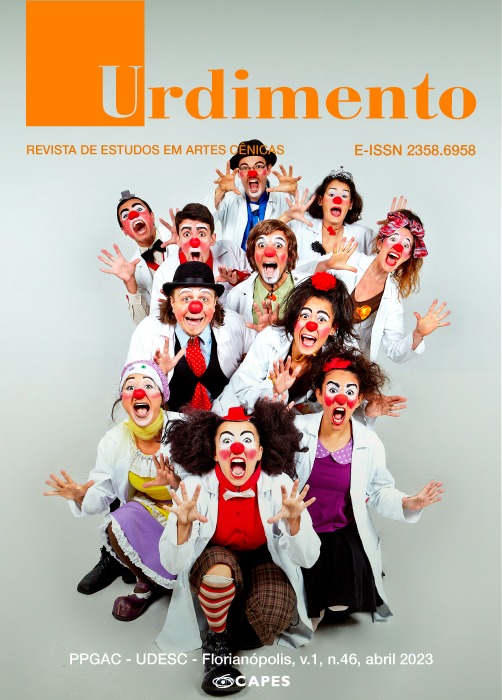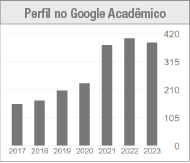A Mães em Rebeldia - uma análise sobre o artivismo na palhaçaria
DOI:
https://doi.org/10.5965/1414573101462023e0111Palavras-chave:
povos originários, palhaçaria, desclownização, afetoResumo
Este artigo apresenta a investigação do artivismo na palhaçaria tendo como fonte de análise as caravanas da grupa Mães em Rebeldia e assim problematizou questões estéticas e éticas dessas ações artísticas. Para tanto, tal pesquisa iniciou seu percurso com a descrição da realidade e o posicionamento político e ético das caravanas junto aos Palhaços em Rebeldia em “Aprendendo a ser Rebelde”. Em seguida com “Artivismo afetivo” desenvolvem-se reflexões acerca do conceito filosófico de afeto e o artivismo como ferramenta potencializadora de ação de alegria. A pesquisa então, desenvolveu o conceito de desclownização em “Do fracasso pessoal ao fracasso coletivo”, expandindo assim para reflexões sobre a renovação da prática da palhaçaria tendo como base a concepção de nhandereko e teko porã expressões que em Guarani representam o “bem viver”.
Downloads
Referências
ABREU, Ana Carolina Fialho. Hotxuá à luz da etnocenologia: a prática cômica Krahô. Dissertação (Mestrado em Artes Cênicas) - Universidade Federal da Bahia, 2015.
DEL BOSQUE, Andrés. La tribo imaginaria. Rebento, São Paulo, n. 9, p. 102-120, dez. 2018.
DELEUZE, Gilles & GUATARRI, Felix. O que é filosofia? Rio de Janeiro: Editora 34, 1993.
FERRACINI, Renato; FEITOSA, Charles. A questão da presença na Filosofia e nas Artes Cênicas. ouvirOUver, Uberlândia, v. 13, n. 1, p. 106–118, 2017. Disponível em: https://doi.org/10.14393/OUV20-v13n1a2017-8. Acesso em: 27 abr. 2023.
BONFITTO, Matteo. Entrevista com Erika Fischer Lichte. Conceição/Conception, Campinas, v. 2, n. 1, p. 131–141, 2013. Disponível em: https://doi.org/10.20396/conce.v2i1.8647719. Acesso em: 27 abr. 2023.
FREIRE, Paulo. Educação como prática de liberdade. Rio de Janeiro: Paz e Terra, 2002.
KRENAK, Ailton. Caminhos para a cultura do bem viver. São Paulo: Cultura do Bem Viver, 2020.
MARTINS, Christiane de Fátima. O espectador da performance urbana artivista: uma análise da recepção da intervenção Cegos, do Desvio Coletivo. Tese (Doutorado em Artes) - Universidade de São Paulo, 2021.
MUNIZ, Zilá. A improvisação como elemento transformador da função do coreógrafo da dança. São Paulo: Hucitec, 2021.
PRADO, Ivan. Entrevista concedida a Paula Bittencourt, por telefone em 23 jan. 2023.
SANTOS, Boaventura de Sousa. Para uma sociologia das ausências e uma sociologia das emergências. Revista Crítica de Ciências Sociais, 63, outubro 2002: 237-280. Acesso em: 23 out. 2022.
SPINOZA, Benedictus D. A ética. Belo Horizonte: Autêntica, 2007.
Publicado
Como Citar
Edição
Seção
Licença
Copyright (c) 2023 Urdimento - Revista de Estudos em Artes Cênicas

Este trabalho está licenciado sob uma licença Creative Commons Attribution 4.0 International License.
Declaração de Direito Autoral
Os leitores são livres para transferir, imprimir e utilizar os artigos publicados na Revista, desde que haja sempre menção explícita ao(s) autor (es) e à Urdimentoe que não haja qualquer alteração no trabalho original. Qualquer outro uso dos textos precisa ser aprovado pelo(s) autor (es) e pela Revista. Ao submeter um artigo à Urdimento e tê-lo aprovado os autores concordam em ceder, sem remuneração, os seguintes direitos à Revista: os direitos de primeira publicação e a permissão para que a Revista redistribua esse artigo e seus meta dados aos serviços de indexação e referência que seus editores julguem apropriados.
Este periódico utiliza uma Licença de Atribuição Creative Commons– (CC BY 4.0)




